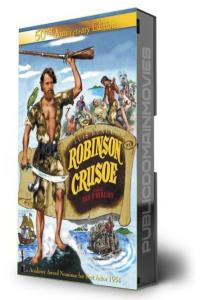Robinson Crusoe

Luis Buñuel’s “Robinson Crusoe” (1954): A Surreal Journey into Solitude and Survival
Robinson Crusoe (1954), directed by Luis Buñuel, is a fascinating adaptation of Daniel Defoe’s classic novel that stands out for its surreal and psychological depth. Starring Dan O’Herlihy in the titular role, the film strips away the usual adventure tropes and instead explores isolation, human nature, and spiritual transformation with a slow-burning intensity. Buñuel’s signature style subtly seeps into the narrative, creating a meditative atmosphere where Crusoe’s solitude becomes a canvas for existential reflection rather than just a survival story. O’Herlihy delivers a compelling performance, capturing the loneliness and evolving resilience of a man cut off from civilization.
Historically, this film is significant as one of the few mid-20th century interpretations that veer away from pure escapism toward a more introspective, almost allegorical take on the Robinson Crusoe myth. It reflects post-war sensibilities and the era’s philosophical inquiries about man’s place in the world, standing apart from other more straightforward adaptations.







